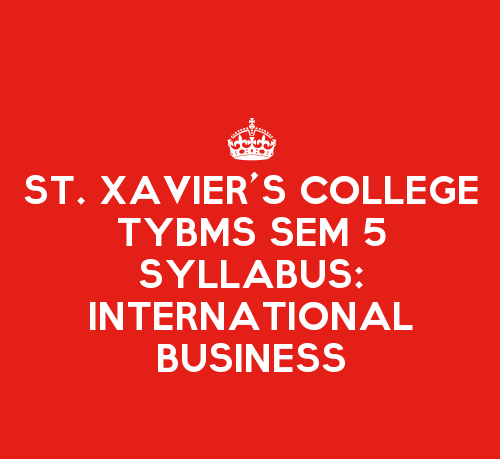International Business is an elective subject in Semester 5 of TYBMS at St. Xavier’s College. International Business introduces BMS students to the global dimensions of management and educates them on the international business theories, the environment, the policies and marketing.
Unit 1 – 15 lectures:
Overview:
- International Business – Introduction,
- Concept,
- Definition,
- Scope,
- Trends,
- Challenges and opportunities,
- Nature,
- Meaning and importance of international competitive advantage,
- Multidimensional view of competitiveness – financial.
Perspectives:
- International monetary systems and financial markets,
- IMF,
- World Bank,
- IBRD,
- IFC,
- IDA,
- Existing international arrangements,
- Globalization and foreign investment – introduction,
- FDI,
- National FDI policy framework,
- FPI,
- Impact of globalization.
Globalization:
- Technology and its impact,
- Enhancing technological capabilities,
- Technology generation,
- Technology transfer,
- Diffusion,
- Dissemination and spill over,
- Rationale for globalization,
- Liberalization and unification of world economics,
- International business theories,
- Trade barriers – tariff and non-tariff barriers.
- WTO and Doha round.
Unit 2 – 15 lectures
- Socio cultural environment:
- Managing diversity within and across cultures,
- Country risk analysis,
- Macro environmental risk assessment,
- Need for risk evaluation,
- Corporate governance,
- Globalization with social responsibility – introduction,
- Social responsibility of TNC,
- Recent development in corporate social responsibility and policy implications.
Global Human Resource Management:
- Selection,
- Development,
- Performance appraisal and compensation,
- Motivating employees in the global context and
- Managing groups across cultures,
- Multicultural management.
Unit 3 – 15 lectures
- Meaning and importance of international marketing,
- International marketing strategies of product development,
- IPLC,
- Role of packaging and pricing policy in international markets.
- Overseas market selection: methods of market entry and selecting potential markets.
- Segmentation of markets,
- Evaluating potential markets.
Unit 4 – 15 lectures
- Selection of overseas distribution channels,
- Types of foreign intermediaries,
- Constraints in entering global territories.
- Export-import documents,
- Import and export procedures.
- INCOTERMS
- Break-even pricing,
- Government initiatives for export promotion.
Continuous Internal assessment:
- Mid – semester test
- Project work – presentation.
Reference Books:
- International Business: Environment and Management – Bhalla V.K.
- International Business – Rao, P. Subba
- Business Government Society – Glodsmith, Arthur A.
- The Global Economy in Transition – berry, brian J.L., Edgar C. Conkling and D. Michael Ray




3 Comments